
NBA Street is a basketball video game developed by NuFX and EA Canada and published by Electronic Arts under the EA Sports BIG label. It was released for the PlayStation 2 on June 19, 2001, and on February 5, 2002, for the GameCube. The game combines the talent and big names of the NBA with the attitude and atmosphere of streetball.

Midnight Club: Street Racing is a 2000 racing video game developed by Angel Studios and published by Rockstar Games. The game focuses on competitive street racing and the import scene. Two distinct versions of the game were released for the PlayStation 2 and Game Boy Advance platforms, the former being a launch title for the platform. It is the first game in Midnight Club franchise, followed by Midnight Club II.

NASCAR: Dirt to Daytona is a racing simulator developed by Monster Games and published by Infogrames in November 2002 for the PlayStation 2 and GameCube. It features NASCAR's Dodge Weekly Racing Series, Featherlite Modified Tour, Craftsman Truck Series, and the NASCAR Winston Cup Series. The Dodge Weekly Racing Series and Featherlite Modified Tour rosters consist of generic fantasy drivers. The Craftsman Truck Series also features fantasy drivers alongside real ones. The unique feature of having to work your way up through the ranks from the low tier Weekly Racing Series to the Cup Series would later return in EA Sports' NASCAR 2005: Chase for the Cup.

Dave Mirra Freestyle BMX 2 is a 2001 BMX video game developed by Z-Axis and published by Acclaim Entertainment under their Acclaim Max Sports label. It is the sequel to Dave Mirra Freestyle BMX. It was released for the PlayStation 2 in August 2001, and in the following months it was ported to the GameCube, Game Boy Advance, and Xbox video game systems. Both the GameCube and Xbox ports featured two extra levels that were not present in the PS2 version.

Bruce Lee: Quest of the Dragon is a beat 'em up video game featuring martial artist Bruce Lee. It was developed by Ronin Entertainment and published by Universal Interactive. It was released in Europe and the United States for the Xbox in 2002 to a negative critical reception. A planned sequel was cancelled.

Freaky Flyers is an air racing video game developed internally by Midway San Diego for the Xbox and PlayStation 2, while the version for the GameCube was developed by Point of View, Inc. and published by Midway.

NHL 2002 is a video game released by EA Sports in 2001. It is the predecessor to NHL 2003. The game's cover man is Pittsburgh Penguins superstar and owner Mario Lemieux, who had just made a comeback after being retired for three and a half years. It was the first installment of the NHL series to be released on Xbox.

ESPN MLS ExtraTime is a sports video game released in 2001-2002 by Konami. It is available for PlayStation 2, Xbox, and GameCube. Clint Mathis is on the cover. The original ExtraTime was released for PS2 seven months after ESPN MLS GameNight on the PlayStation, with the GameCube and Xbox versions released in 2002 afterward as ESPN MLS ExtraTime 2002. MLS ExtraTime was the last in the series as the MLS sold its video game license to EA Sports' FIFA series.
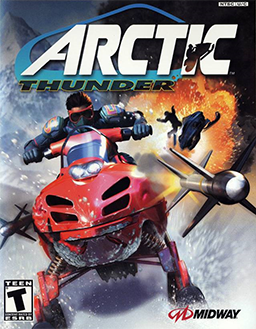
Arctic Thunder is a 2001 snowmobile racing game developed by Midway Games. It was released as an arcade game, Midway's final arcade title, and was also ported to the Sony PlayStation 2 and Xbox consoles, as a launch title for the latter. In the arcade version of the game, jets blow cold or hot winds, depending on the setting, in the player's face during gameplay. Arctic Thunder is part of Midway's Thunder series, which also included Hydro Thunder, 4 Wheel Thunder, Offroad Thunder, and Hydro Thunder Hurricane. An updated arcade version also appeared named Ultimate Arctic Thunder.

MLB Slugfest 2003 is a baseball video game published by Midway Sports in 2002. It is the first game in the MLB Slugfest series. Alex Rodriguez from the Texas Rangers is the cover athlete.

NCAA Football 2003 is a video game of the sports genre released in 2002 by EA Tiburon. Its cover athlete is former Oregon Ducks quarterback Joey Harrington.
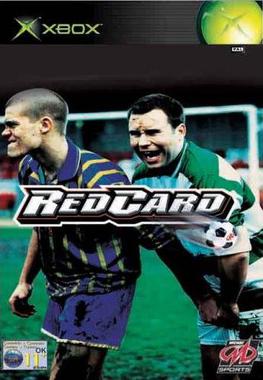
RedCard 2003, known as RedCard in Europe, is a video game based on association football, released in 2002 by Point of View. The game follows most of the rules of football, but allows for heavy tackles and special moves once the player has charged up a special meter.

NBA Hoopz is a 2001 basketball video game published by Midway. It is the sequel to NBA Hangtime and NBA Showtime: NBA on NBC. Hoopz was the only 3-on-3, arcade-style basketball video game available during the 2000–01 NBA season. Shaquille O'Neal is featured on the game cover.

NASCAR Heat 2002, sometimes mislabeled as NASCAR Heat, is a NASCAR video game produced by Infogrames for the Xbox, PlayStation 2, and Game Boy Advance consoles. It is the successor to the 2000 game NASCAR Heat, and the predecessor to NASCAR: Dirt to Daytona. NASCAR Heat 2002 can have up to 24 (PS2) or 43 racers on one of 19 official NASCAR tracks, and the game was released in June 2001 for PlayStation 2. A port for the Xbox was released in November 2001. Developed by Crawfish Interactive, a distinct version for Game Boy Advance was released in May 2002.

MX Superfly featuring Ricky Carmichael, released as MX Super Fly in PAL regions, is a motocross racing game developed by Pacific Coast Power & Light and published by THQ for the Xbox, PlayStation 2, and GameCube. It is the second installment of THQ's MX trilogy and a sequel to MX 2002 featuring Ricky Carmichael, garnering professional motocross racer Ricky Carmichael's endorsement like its predecessor.
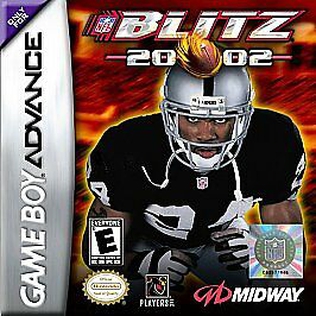
NFL Blitz 2002 is a video game published by Midway for Game Boy Advance in 2001, and for GameCube, PlayStation 2 and Xbox in 2002.
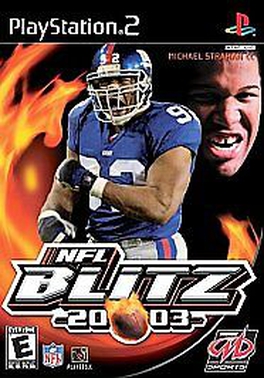
NFL Blitz 2003 is a video game published by Midway Sports for Game Boy Advance, GameCube, PlayStation 2 and Xbox in 2002.
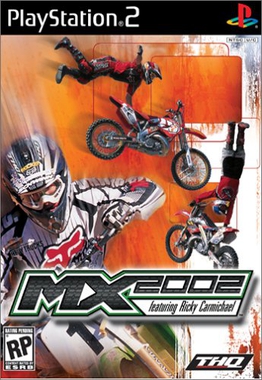
MX 2002 featuring Ricky Carmichael is a video game developed by Pacific Coast Power & Light and published by THQ for the PlayStation 2, Xbox and Game Boy Advance in 2001. It is the third motocross racing game published by THQ to be endorsed by professional motocross racer Ricky Carmichael, after Championship Motocross featuring Ricky Carmichael and its sequel, Championship Motocross 2001 Featuring Ricky Carmichael, as well as the first game in THQ's MX trilogy, a follow-up series to the Championship Motocross duology that would eventually become part of its MX vs. ATV crossover racing franchise. A sequel, MX Superfly, was released in 2002 and also endorsed by Carmichael.

Mike Tyson Heavyweight Boxing is a boxing video game developed by Atomic Planet Entertainment and published by Codemasters for the PlayStation 2 and Xbox in 2002. It is a sequel to Mike Tyson Boxing (2000) that was released for the PlayStation.




















